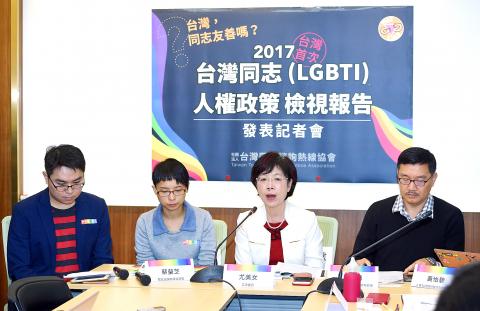The Taiwan Tongzhi Hotline Association yesterday released its Taiwan LGBTI Rights Policy Review for last year — which it described as the first comprehensive report on the nation’s policies regarding lesbian, gay, bisexual, transgender and intersex (LGBTI) people — and which suggests ways to improve gender equality education and address hate crimes, workplace discrimination, same-sex marriage, long-term care and transgender and intersex peoples’ rights.
The report was compiled through extensive literature reviews, field research and interviews with experts, and overhauls current policies on LGBTI rights, the association said.
“There has never been a comprehensive report on the government’s LGBTI policies,” association secretary-general Tsai Ying-chih (蔡瑩芝) said, adding that “previous reports on those policies are either limited in scope or lacking in statistical evidence.”

Photo: Liao Chen-huei, Taipei Times
“The government has constantly ignored the LGBTI community and because of that LGBTI people are not sufficiently protected by the law,” she said.
The report found that, while many laws and regulations fail to address the rights of LGBTI people — such as the Civil Code, which excludes same-sex marriage — some laws directly contribute to discrimination.
One example is “the standards for blood donors” issued by the then-Department of Health — now the Ministry of Health and Welfare — that bans men who have had sexual intercourse with another man from donating blood, Tsai said.
The problems are compounded by a lack of awareness about LGBTI issues in law enforcement and backlash from groups opposed to LGBTI rights, Tsai said.
Based on the report, the association called on the government to improve legal protections for LGBTI people and to raise awareness of LGBTI issues in law enforcement agencies.
The government should take a person’s gender and sexual orientation into consideration when conducting surveys and research to make policies more LGBTI-friendly, Tsai said.
The association also urged the government to devote more resources to educating the public about gender equality and to avoid policies and wording that reinforce gender stereotypes.
“President Tsai Ing-wen (蔡英文) has described her government as one that cares about human rights. We hope that the Tsai administration can do more than include human rights in their slogan,” Tsai Ying-chih said.
“Since the Council of Grand Justices ruled that same-sex marriage should be legalized, marriage equality appears to have been realized, but the report shows that discrimination is still prevalent,” Democratic Progressive Party Legislator Yu Mei-nu (尤美女) said.
The government is to look into the suggestions, Department of Gender Equality official Chao Hui-wen (趙惠文) said, adding that on Jan. 3 last year, it added policies on sexual minorities in its Gender Equality Policy Guidelines and has since been working on promoting the rights of LGBTI people, although it might take a while for society to change.
The complete report is available at the association’s Web site hotline.org.tw.

A strong continental cold air mass is to bring pollutants to Taiwan from tomorrow, the Ministry of Environment said today, as it issued an “orange” air quality alert for most of the country. All of Taiwan except for Hualien and Taitung counties is to be under an “orange” air quality alert tomorrow, indicating air quality that is unhealthy for sensitive groups. In China, areas from Shandong to Shanghai have been enveloped in haze since Saturday, the ministry said in a news release. Yesterday, hourly concentrations of PM2.5 in these areas ranged from 65 to 160 micrograms per cubic meter (mg/m³), and pollutants were

Taiwan’s armed forces have established response protocols for a wide range of sudden contingencies, including the “Wan Chun Plan” to protect the head of state, the Ministry of Defense (MND) said today. After US President Donald Trump on Saturday launched a series of airstrikes in Venezuela and kidnapped Venezuelan President Nicolas Maduro, concerns have been raised as to whether China would launch a similar “decapitation strike” on Taiwan. The armed forces regularly coordinate with relevant agencies and practice drills to ensure preparedness for a wide range of scenarios, Vice Minister of National Defense Hsu Szu-chien (徐斯儉) told reporters before a

EVA Airways on Saturday said that it had suspended a pilot and opened an investigation after he allegedly lost his temper and punched the first officer several times as their plane was taxiing before takeoff at Los Angeles International Airport. According to a report published on Thursday by The Reporter, the incident occurred after the flight’s Malaysian first officer tried to warn the Taiwanese pilot, surnamed Wen (文), that he was taxiing faster than the speed limit of 30 knots (55.6kph). After alerting the pilot several times without response, the first officer manually applied the brakes in accordance with standard operating

NOT AN OPENING: Trump’s violation of international law does not affect China’s consideration in attacking Taiwan; Beijing lacks capability, not precedent, an official said Taiwanese officials see the US’ capture of the president of Venezuela as a powerful deterrent to Beijing’s aggression and a timely reminder of the US’ ability to defeat militaries equipped with Chinese-made weapons. The strikes that toppled Venezuelan President Nicolas Maduro signaled to authoritarian leaders, including Chinese President Xi Jinping (習近平), US President Donald Trump’s willingness to use military might for international affairs core to US interests, one senior official in Taipei’s security circle said. That reassured Taiwan, the person said. Taipei has also dismissed the idea that Trump’s apparent violation of international law could embolden Beijing, said the official, who was not